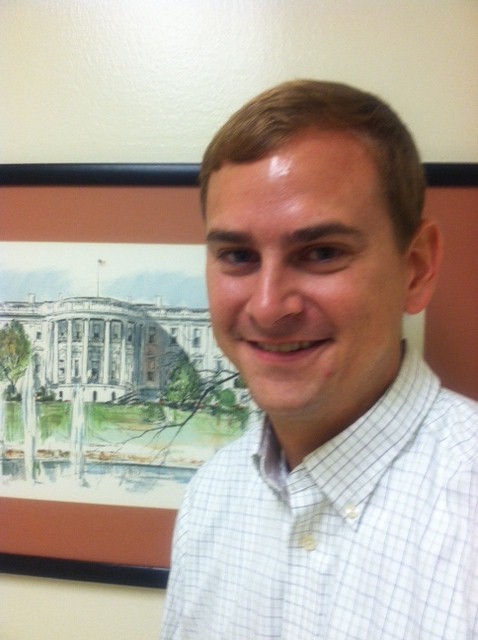Baylor University Political Analyst Says New Romney Ad Is the First Foray into Religious Rhetoric in the Presidential Campaign

Andy Hogue, Baylor political science lecturer, analyzes new Romney ad.
(Photo by Terry Goodrich, Baylor Media Communications)
Media Contact: Terry Goodrich, (254) 710-3321
Follow us on Twitter:@BaylorUMediaCom
WACO, Texas (Aug. 10. 2012) -- A new political ad by presidential candidate Mitt Romney, in which he accuses President Obama of "waging war on religion," is an opening salvo in religious rhetoric that likely will escalate as the November election approaches, predicts a Baylor University political expert and author.
"Here we go," said Andy Hogue, Ph.D., a lecturer in Baylor's department of political science, College of Arts & Sciences, and author of the new book Stumping God: Reagan, Carter, and the Invention of a Political Faith (Baylor University Press). The new video ad poses the question, "Who shares your Values?" It declares Obama's health care plan forces religious institutions to go against their faith.
In the ad, Romney is shifting away from what has been a major focus --economic issues - to appeal to religious voters, said Hogue, noting that religion as a political issue has slipped beneath the radar since the primaries, when attention was focused on Romney's Mormonism.
The ad shows color video of Romney last month on his visit to Poland, including an excerpt from a speech he gave there. "In 1979, a son of Poland, Pope John Paul II, spoke words that would bring down an empire. Be not afraid," Romney says. The ad shows the Pope speaking with ex-Polish President Lech Walesa, former leader of the labor movement that helped end Communist rule, and a video of Walesa and Romney shaking hands. The screen's text says the ad is endorsed by Walesa, and a voice asks, "When religious freedom is threatened, who do you want to stand with?"
Said Hogue: "What we've seen up until now was a bit of a truce between the two candidates because in the eyes of a lot of religious voters, both men have religious skeletons in the closet--Romney with his Mormonism and Obama with the Jeremiah Wright flap that was so prominent in the last election, as well as the rampant misunderstandings about his faith.
"What's interesting in this ad is the subtlety with which Romney compares John Paul II's fight against the Soviet Union and its hostility to religion with American voters' fight against Obama. The Obama administration becomes, in effect, the new 'evil empire.' Given many religious voters' skepticism about Romney's Mormonism, this is a smart way for him to deflect that skepticism and turn the focus to Obama.
"If the voters who cared most about a candidate's faith were skeptical of Romney's faith, it's no surprise that his Mormonism became a big issue in the primaries," Hogue said. "But Romney won, and given the alternative of Obama, a lot of evangelicals have decided it better to coalesce around a Mormon than a Democrat.
"Neither candidate has seemed eager to play up religion. But that truce wasn't likely to last long, not with so much outside spending in this campaign."
Hogue said voters should "move beyond the haze of rhetorical appeals that cloud the political process."
"We have to keep in mind what presidential elections are really all about," he said. "I don't discount the symbolic nature of presidential elections; this is the one and only time that we all vote for someone or something . We Americans are a religious people, and it makes good sense that that's reflected. . . . But we have to keep in mind exactly what it is we're voting for, which is a person to fill an office that is constrained by what the Constitution allows."
Hogue noted that sparring over religion's role in government became commonplace beginning in the 1980 election, when Ronald Reagan, Jimmy Carter and John B. Anderson charted new territory by appealing overtly to voters' religious sensibilities and making public their religious commitments.
"We've seen that question posed, in one way or another, in every election since. To listen to some candidates--of either party--you'd think that ending abortion or poverty or putting America back on the right moral plane is as simple as awarding them your vote. That's a gross misreading of how our political system works, and it's incumbent upon us as voters to see through that."
ABOUT BAYLOR UNIVERSITY
Baylor University is a private Christian university and a nationally ranked research institution, characterized as having "high research activity" by the Carnegie Foundation for the Advancement of Teaching. The university provides a vibrant campus community for approximately 15,000 students by blending interdisciplinary research with an international reputation for educational excellence and a faculty commitment to teaching and scholarship. Chartered in 1845 by the Republic of Texas through the efforts of Baptist pioneers, Baylor is the oldest continually operating university in Texas. Located in Waco, Baylor welcomes students from all 50 states and more than 80 countries to study a broad range of degrees among its 11 nationally recognized academic divisions. Baylor sponsors 19 varsity athletic teams and is a founding member of the Big 12 Conference.
ABOUT BAYLOR COLLEGE OF ARTS AND SCIENCES
The College of Arts & Sciences is Baylor University's oldest and largest academic division, consisting of 26 academic departments and 13 academic centers and institutes. The more than 5,000 courses taught in the College span topics from art and theatre to religion, philosophy, sociology and the natural sciences. Faculty conduct research around the world, and research on the undergraduate and graduate level is prevalent throughout all disciplines.